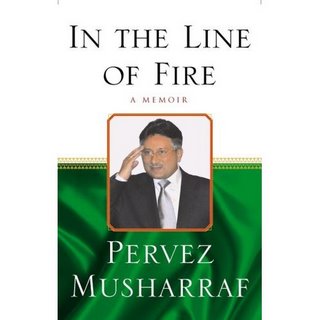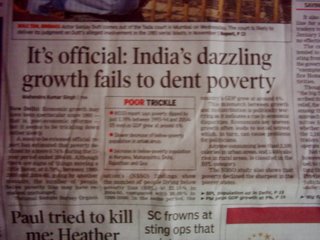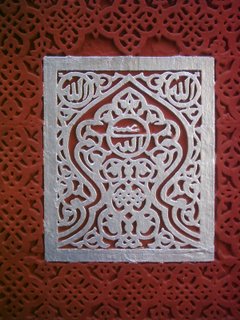
Saturday, March 17, 2007
Friday, November 03, 2006
Feminism Machismo and the Victim Culture
See this picture, not that one didn't know it but to appear on the cover page of Time of India is phenomenal. It a sign of inequalities not only economical but others too. But aren't we all fighting in this modern world to eliminate or atleast decrease inequalities? At times looking from a psychological prospective I feel we are not only creating a bigger wedge between the have and the have not we are also dividing those sitting on the fence.
More and more are we building a world where one has to be opinionated and if someone is not, he is dumb or is out of an intellectual conversation. The media encourages us to "Be someone". Being "normal", "ordinary" or "common" is not cool neither in fashion. So then what kind of egalitarian world are we talking about when everybody is encouraged to be "different" and a just-a-face-in-the-crowd personality is not attractive anymore? I call it the death of the ordinary.
Some Screen Shots from Everybody's Fool by Evanescence...
The video harps on the same issue- a world where everybody has to be somebody. So noone should be ordinary. Infact one of the scenes also depicts the "use" of women for glamorous purposes, how they are used as showthings in the name of fashion.
The other day I went to vasant vihar to see a bunch of people from a group called Black Noise (the name gives me bouts of depression), the group claims to confront eve-teasing with some out of the box ideas(one of which is this ), its a letter they hand over to many of the people using the South Extn. subway in Delhi. Umm good idea I'd say. If I look at this act from a very conservative prospective I'd rather end up ask the girls the same questions as many fathers or brother would -Why did you had to go to such a crowded place at first place? But hey I'll refrain, thinking that I'll be called a chauvinist pig. Ideally if I talk to my parents that im being mistreated at a place they'll advise me not to go there. It's a very typical Indian approach, "don't like it? Lump it". But this generation is not as passive as my parents I guess. I heard Suketu Mehta (yeah the Gujju dork who wrote Maximum City) say this as a reply to Naomi Wolf's lecture on feminism at the India Today Conclave and I reproduce parts from his speech "We can't look to our fathers for guides to how we interact with women today. We're not sole providers anymore; it's equally likely that a woman will put food on the table, and expect her man to chop and cook it. We're expected to have an equal share in parenting, but the courts are stacked against men in most custody disputes". And I cannot agree more, this generation is not brought up with the same values as was my mother's generation, this generation has picked up lessons as much from the "K" soaps (they really don't have any lessons to begin with apart from some frustrated soccor moms indulging in cheap tricks for cheap thrills) as from Sex and the City. He goes on to say "What's happening in India today is not the same thing as what happened in America in the '60's and '70s. Indian men and women don't have to follow the American example. We don't have to be that polarized; we don't have to be power feminists or machistas. We have our own understanding of each other, which is complex and subtle, and time-tested." Again, I cannot stop nodding. The relationship Indian men share with Indian men is not the same as western men share with western women. Therefore forcing western feminism (there is even difference between forms of feminism in America) cannot only be judged as a foolish acts by some frustrated Indian women who are virtually talking male bashing and not feminism per say. By propagating women as "different" from men (and therefore needs to maintain a different path) what are we doing? Are we creating equality or are we just wedging them further? Same goes with the OBCs and Muslims ( I know I shouldn't mix them). So by recognizing that OBCs are (or were) suppressed and underprivileged and therefore needs different treatment in the hands of law aren't we isolating them from the "others". It also creates a feeling of frustration amongs those who are not given the same treatment just coz they don't fall into that catagory by virtue of their birth. In all the three cases Feminism, OBCs and Muslims we see that whoever falls in this category is isolated by the others, so though they get the velvet treatment in many places but they are ghettoized in the main stream (Muslims and OBCs being great examples) as the others see them gaining advantage not on the basis of individual merit but on the basis of collective demerit (religious minority in case of Muslims, people of backward class in case of OBCs). So is this not also part of the Victim Culture? One of the best answer to this question of mine also come from the same speech Suketu Mehta delivered.
Here's a beautiful paragraph he read on why many Indian marriages work inspite of being judged "unequal" by many western minds and I'd like to reproduce it...
"There's a radical difference, of course, between urban Indian women and women in the villages, who are in much more solidly defined sex roles. But we can't just look at the Indian village as a province of superstition, discrimination, and illiteracy. This is the culture that has sustained the world's oldest continuing civilization; there must be something of real value, to both women and men, for it to have lasted so long. I am thinking now of the marriage of my grandparents and parents, both 'arranged' marriages. They are among the happiest marriages I have ever seen, although not quite 'equal' in the western sense. My grandfather ran his jewelry business on the first floor of an old Calcutta building, and my grandmother stayed home on the third floor and cooked and raised six children. As was the custom, not once, in their lifetime, did they say out loud each others' names, but they had no problems talking to each other; shouting, whispering, cajoling, threatening, pleading, singing. They never needed to step out of their roles; they never felt any need to stop becoming man and woman. My grandmother loved my grandfather not in spite, but *because* he was a man, and she liked taking care of him. She knew what he wanted to eat before he even realized he was hungry for it. And my grandfather always loved the pretty girl in my grandmother, the girl he got betrothed to when she was thirteen. Her beauty was no myth for him; he was exalted by it every day. When my grandmother passed away, in her eighties, my grandfather had no more wish to remain on earth. "Your Ba is waiting for me," he kept saying, and followed her in under a year of her passing."
I love him saying this not coz I'm Indian and therefore resolute in liking it but coz it some how spills the beans of any firm relationship, that the best of relationships are perhaps not equal, the master need to have a slave, a husband needs to have a wife (no I'm not comparing a wife to a slave).
Today was a torturous Thursday and I feel I'm almost suffering from TB. The cough has not gone for almost a month (did I tell you I drink a lot of chilled water? hehe). The mag is also in its final stages so this time I might get to do some desktop publishing job as well which is good. I become the jack of all the trades. I still need to conduct atleast one interview for principal speak and a feature on Austraaalian Education ( the lady at IDP never returns the call). Its almost 2 (yeah am doode) and me must get me arse to bed.
(Reproduced from my other Blog)
Wednesday, October 04, 2006
Mush and the art of staying in news

Mush has done it again what he's good at doing- Staying in the news but rather through controversies. This time its a book of revelation. His autobiography meant to drop a bombshell on many famous personalities. The timing could have been better but the General seems too desperate to stay in the news. Many are questioning his rephrasing of history and whether he's done that to stir the pot again or to get the sympathy he's loosing back from the West. In a desperate attempt he even accuses India of stealing nuclear secrets from nobody else rather than their disposed nuclear scientist A Q Khan. Thought many personalities including former PM AB Vajpayee have rubbished his claims many are questioning his peculiar ways of promoting the book. Musharaff is one of the few world leaders to have published an account of past events while in the office. Lately he used an official US visit to promote his new book, appearing on various talk shows including a popular CNN comedy show Comedy Central. The cunning host while pouring tea for the General asked him where Osama is. The General initially taken aback confronted him with equal cunningness and replied " I don't know, you know where he is? You lead on, we'll follow you." It was followed by laughter by the crowd present. But the biggest laughter came when the host asked him "George W. Bush and Osama bin Laden -- be truthful -- who would win a popular vote in Pakistan?" to which the General replied "I think they'll both lose miserably". General in not the most famous ruler Pakistan has ever seen but it’s his art of balancing his reputation as the moderate face of Pakistan to his allies in the west and as a "saviour of Pakistan" face to his country that has seen him manoeuvre Pakistan thought the tough times after 9/11. And from what is apparent his book In the Line of Fire is selling well. It sold more than 12,000 copies in the first two days. But what needs to be seen is for how long can he hold his fort with his mix of myth and reality.
Friday, September 29, 2006
Islam and Islamic Art in India
I don't usually write about things religious and this amount of words can certainly not do justice to the topic. Its a volitile topic and need more competence about how cultures have evolved. But visitng the Hazrat Nizzamuddin's Dargah and really made me write about Islam's contribution to art especially Persian and Arab art form. Without belittling Hindu art forms, I would like to emphasize the importance of contribution of Islamic art to Indian art forms.
Therefore, the art forms that exists today in India are a mix of original Hindu art form which were later impregnated by the Persian art forms brought by Persian rulers or the Islamic Sultanates namely the Lodhis, the Sirrajjud Dhaula etc. It was later followed by barbaric invasions by the Mughals. The decline of the Mughal Empire saw the rise of various regional empire like the Maratha Empire and Marwar in western India and the Sikh Empire in the north. But none of them could match the grandeur, scale or the impact of Mughal Empire and its contribution to culture and history. I will refrain myself from commenting or judging on the impact of this Islamic era. The Hindu and Sikh zealots obviously term the impact as negative and argue that Islam in India was forced as in Persia. But the others believe that its the sufi cult of Islam that has brought about the popularity. Whichever way it is has been brought, its contribution cannot be neglected to the world of Indian Art. Take a look at pictures below and you'll know what I'm talking about.
Though I admit that I'm not really comfortable in a typical Islamic setting, but just like many westerners Islam is as exotic to me as the western world, even though I feel uncomfortable in Dargahs(I was not really exposed to Islamic culture as a child) and Mosques, I feel an urge to go in to explore as to what is there in Islam that so many people are drawn to it.
So till date what I'v experienced, visitng my immediate neighbourhood Dargahs and Mosques, is that Islam is not a religion, it's a way of life...a lifestyle. It covers every aspect of a person's life. Everybody's duties and previlages are clearly defined. Islam comes under special criticizm, even hatred from many "barbarians" for its treatment of women. Good or bad, modern or rudimentary, Islam clearly defines the duties and limits of men and women. This is the reason I feel more and more people, of which a huge chunk are westerns, are drawn to it. It's not only exotic its New, something they have not experinced living in a western country.
Freedom is not always a positive term, though in today's context freedom is used again and again by propogandists to augment their interest. Islam gives them a sence of belonging. For the most of western world today, The Church is hardly the centre of authority. The young generation which moves out of their parents homes find it increasingly difficult to face the emotional challenges posed by the modern world. In this time of lack of moral guidence Islam provides a frame work with direction and strict code of moral conduct. Many people also use it as a medium of experimentation to flirt with a religion which has rigerous code of personal conduct. It comes as a high to experiment with things which are challenging at an age where the personality is still being shaped. And to many its even a way to rebel against a social system where they don't fell belonged to or one which has given them nothing or they feel left behind.
...To Be Continued





